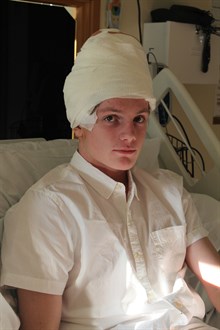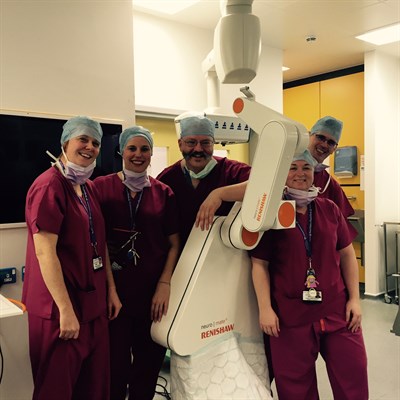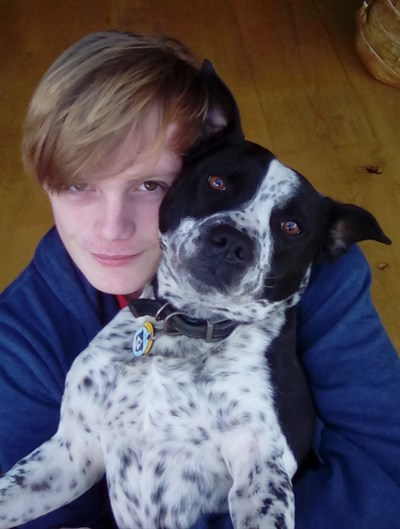02 February 2016
First paediatric epilepsy patient treated at Bristol Children’s Hospital with robotic stereotactic EEG
The first paediatric patient from the southwest has successfully
undergone Robotic Stereotactic implantation of EEG recording
electrodes as part of their workup for epilepsy surgery at Bristol
Royal Hospital for Children.

Billy Whitaker, 15 from Cornwall, became the first paediatric
epilepsy case to undergo the procedure at Bristol Children's
Hospital on Thursday 14 January.
The robotic stereotactic EEG uses smart technology derived from
the engineering world, together with high precision image guidance-
to enable surgeons to insert multiple recording electrodes deep
into the brain to investigate potential sites of seizure
initiation.
The technique is extremely accurate and safer and better
tolerated than alternative invasive methods of achieving seizure
localization.
This means that many cases where targets for surgery have been
impossible to locate, may now become surgical candidates for life
changing epilepsy operations.
Robotic technology has previously been used in other
neurosurgical cases, however, this is the first use of the
Neuromates Robot, which was developed by Local company Renishaw, to
treat a paediatric epilepsy case in Bristol. The epilepsy surgery
service at BCH already has 8 other epilepsy patients lined up to
receive the treatment.
Michelle Seymour, epilepsy lead nurse at Bristol Children's
Hospital, said: "This new treatment is a part of process we follow
during the epilepsy programme, when trying to identify children
that might be helped by helped by definitive surgery.
"Invasive recordings are an important part of the process for
selected patients. This new development is better tolerated by
younger patients and offers considerable safety advantages as
well."
The new technique means a lower risk of infection for patients
and also allows important brain areas and blood vessels to be
identified and avoided during electrode implantation. Patients
fitted with electrodes undergo a period of recording under close
supervision by the epilepsy surgery team. Normal medications are
reduced to allow seizures to develop and the patterns of electrical
activity recorded analysed. If a defined seizure origin can
be identified away from important functional, it may then be
removed at a subsequent operation.
Michael Carter, consultant neurosurgeon at Bristol Children's
Hospital, said: "I am delighted to announce the robotic
stereotactic EEG was a success both technically and clinically.
This procedure was the culmination of an enormous amount of work by
many people in the epilepsy and theatre teams, and would not have
been possible without the funding provided by The Grand
Appeal."
"Billy recovered well from the procedure and we obtained superb
data from the recording electrodes that will allow us to treat his
intractable epilepsy surgically.
"This event represents a revolutionary transition into the
21st century for epilepsy surgery in Bristol and the South West and
absolutely cements our credentials as a premier paediatric epilepsy
surgery facility not only for this city, but comparable with
anything worldwide."

Billy Whitaker said: "The possibility of being seizure free
means I will be able to take part in sports like football and rugby
again. I love playing sport and continue to play golf but since my
epilepsy diagnosis I can no longer play for teams as this often
increases the number of seizures I have.
"It is exciting to be the first patient to have been treated at
the hospital with this technique, especially as I and my family
have travelled all the way from Cornwall. Although it is sometimes
boring being monitored, the care I have received and the nurses who
have treated me, have inspired me to look at the potential of
working for the NHS and in a hospital."

The Grand Appeal has raised over £31 million to support sick
babies and children at Bristol Children's Hospital and the Special
Care Baby Unit at St Michael's Hospital providing life-saving
equipment, patient activities, new services and family
accommodation. The Appeal runs Cots for Tots House - a 12 bedded
family accommodation unit for the parents of critically ill babies
treated in the Special Care Baby Unit. For more information about
Cots for Tots, visit www.cotsfortots.org.uk
.
Bristol Children's Hospital is one of the UK's leading
children's hospitals treating patients from across the South West,
South Wales and beyond with life-threatening illnesses and serves
as the paediatric intensive care centre for the whole South West
region. The hospital is an international, national and regional
specialist centre of excellence for a range of services including
neurosurgery, burns, cardiac, leukaemia and bone marrow
transplants.
For more information, visit
www.grandappeal.org.uk
@thegrandappeal
Facebook.com/TheGrandAppeal
 BACK TO NEWS
BACK TO NEWS










